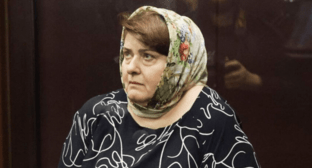19 September 2022, 13:01
Week in the Caucasus: review of main events of September 12-18, 2022
Summing up the outcome of the elections in Southern Russia; aggravation of the conflict on the border between Azerbaijan and Armenia; mass protests in Yerevan and Stepanakert; new sanctions against Kadyrov and his statements in connection with the special military operation in Ukraine, – see the review of these and other events in the Caucasus during the week of September 12-18, 2022, prepared by the “Caucasian Knot”.
Summing up outcome of elections in Southern Russia
On the morning of September 12, election commissions began to announce the results of the voting in the elections that took place on September 9-11 in the regions of the North-Caucasian Federal District (NCFD) and the Southern Federal District (SFD).
In particular, after processing 99.9% of the protocols, according to the election committee of the Krasnodar Territory, the “Edinaya Rossiya” (United Russia) Party won 70.8% of the votes in the elections to the Legislative Assembly of Kuban. The Communist Party of the Russian Federation (CPRF) gained 10.7% of the votes, the Liberal Democratic Party of Russia (LDPR) – 6.6%, “Spravedlivaya Rossiya-For Truth” (Fair Russia-Za Pravdu) – 5.8%, and the “Novye Ludi” (New People) – 4.8%. According to members of the CPRF, during the elections, numerous violations were recorded, but the election commissions actually ignored them. The CPRF’s regional branch announced that it would seek to bring violators to justice.
The “Edinaya Rossiya” Party also won in the elections to the parliament of North Ossetia and the City Duma of Cherkessk: candidates of the “Edinaya Rossiya” Party gained 67.8% of the votes in North Ossetia and 67.5% of the votes in Cherkessk.
Aggravation of conflict on border between Azerbaijan and Armenia
On the night of September 13, the conflict escalated on the border between Azerbaijan and Armenia. According to Aram Torosyan, spokesperson for the Ministry of Defence (MoD) of Armenia, the Azerbaijani troops initiated a large-scale provocation and strike on civilian infrastructure. The Ministry of Defence of Azerbaijan announces that only military facilities are being shelled in response to the provocations of Armenia. On the evening of September 14, a ceasefire agreement was reached with the mediation of Russia. However, despite the agreement, the parties continued to exchange accusations of shelling attacks. According to the authorities, as of September 17, 135 people perished from the Armenian side, including a civilian, while 79 fighters of the Ministry of Defence and the State Border Service perished from the Azerbaijani side. Later, one more Azerbaijani soldier died in the hospital. In addition, six civilians from Armenia and two civilians from Azerbaijan were injured. The military units of the Azerbaijani troops advanced into the territory of Armenia to a depth of 7.5 kilometres: in particular, they approached Djermuk and a number of rural communities, reported Eduard Asryan, the chief of the General Staff of the Armenian Armed Forces, on September 16.
The Security Council of Armenia addressed Russia, the CSTO, and the UN Security Council for support. The CSTO announces that to resolve the situation, only political and diplomatic methods and agreements enshrined in trilateral agreements should be used. It should be noted that on September 18, Nancy Pelosi, the speaker of the United States House of Representatives, arrived in Yerevan. According to Nancy Pelosi, the US Congress condemns the Azerbaijani shelling attacks on the Armenian territory.
Mass protests in Yerevan and Stepanakert
During the parliamentary hour on September 14, Nikol Pashinyan announced his readiness to sign an agreement with Azerbaijan and that Armenia “should settle” the conflict. The Nikol Pashinyan’s statement caused a protest in the Armenian society. According to organizers of the protest, at least 40,000 people gathered near the building of the Armenian Parliament on September 14. The opposition states that the MPs from the ruling faction should sign a document on a vote of no confidence in Nikol Pashinyan, which has already been signed by 35 MPs. On the same day, about 4000 people, dissatisfied with the Nikol Pashinyan’s statement about his readiness to sign a document on the settlement of the Karabakh conflict, gathered on a square in Stepanakert. In the following days, protests in Yerevan and Stepanakert continued. The demands of the protesters included the withdrawal of Armenia from the CSTO and the provision of guarantees for the independence of Nagorno-Karabakh.
New sanctions against Kadyrov and his statements in connection with special military operation in Ukraine
On September 15, the US Department of the Treasury announced imposing sanctions against Ramzan Kadyrov and members of his family in connection with the events in Ukraine. The sanctions list includes the leader of Chechnya himself, his daughters Aishat, Karina (Khadizhat), and Tabarik Kadyrova, his spouse Medni Kadyrova, as well as Fatima Khazueva and Aminad Akhmadova, who were named Ramzan Kadyrov’s wives on the list. The reasons for adding Ramzan Kadyrov to the US sanctions list mention that the leader of Chechnya “mobilized Chechen natives for the war in Ukraine.” Let us remind you that the US Department of the Treasury added Ramzan Kadyrov to the Magnitsky sanctions list back in December 2017, calling the leader of Chechnya responsible for extrajudicial executions, torture, and other human rights violations in Chechnya.
It should be noted that just in the same week, Ramzan Kadyrov made several loud statements in connection with the special military operation in Ukraine. So, on September 11, the leader of Chechnya accused the Russian Ministry of Defence of the mistakes made in the Kharkov Region and expressed his readiness to explain the real situation in Ukraine to the leader of the country and the Ministry of Defence. In response, the Russian presidential press secretary pointed out that Vladimir Putin had no plans to meet Ramzan Kadyrov yet. According to political analysts interviewed by the “Caucasian Knot”, Ramzan Kadyrov, who has become one of the most active critics of Russian Defence Minister Sergey Shoigu, is running for a more significant position, but the Kremlin has rebuffed him. On September 15, the leader of Chechnya said that Russian governors should proactively announce in their regions the self-mobilization of people to form military detachments and send them to Ukraine. Six governors spoke out in support of the Ramzan Kadyrov’s initiative, including Dagestani leader Sergey Melikov.
This article was originally published on the Russian page of 24/7 Internet agency ‘Caucasian Knot’ on September 19, 2022 at 09:35 am MSK. To access the full text of the article, click here.




